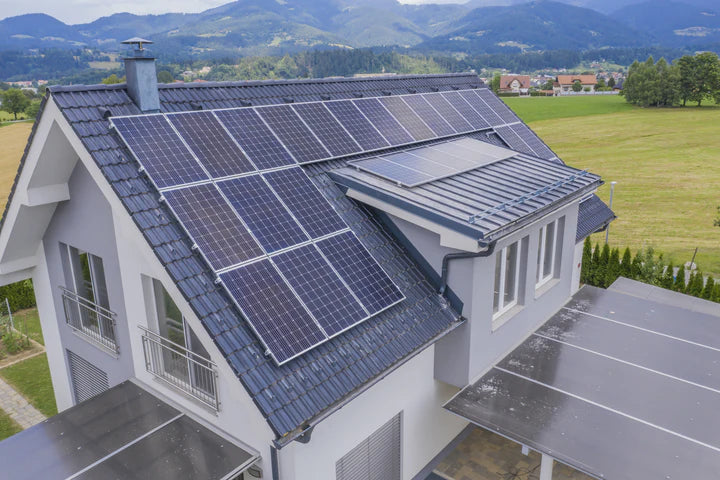
How Many Solar Panels for 1.5 Ton AC?
If you're planning to run a 1.5-ton air conditioner using solar power, then you are at the right place. In this article, we’ll guide you to calculate how many solar panels are required based on the AC's energy consumption and the wattage of the solar panels.
It’s essential to determine how many solar panels are required based on the AC’s energy consumption and the wattage of the panels. This calculation ensures you can run your AC efficiently without interruptions.
Power Consumption of a 1.5 Ton AC
A typical 1.5-ton air conditioner consumes around 1.6 kW to 2.0 kW of power per hour. Over an 8-hour usage period, this amounts to approximately 12.8 kWh to 16 kWh of electricity needed daily.
Now, let’s calculate how many panels you’ll need for different wattages.
Number of Panels Needed Based on Wattage
The number of panels you’ll require depends on the panel’s capacity. Here’s a breakdown using different wattages:
How Many 250W Panels for a 1.5 Ton AC?
A 250W panel generates roughly 1 kWh per day.
16 kWh/day ÷ 1 kWh/panel/day = 16 panels
You’ll need 16 panels of 250W to power your AC for 8 hours.
How Many 580W Panels for a 1.5 Ton AC?
A 580W panel produces around 2.32 kWh per day.
16 kWh/day ÷ 2.32 kWh/panel/day ≈ 7 panels
You’d need 7 panels of 580W to run your 1.5-ton AC.
How Many 585W Panels for a 1.5 Ton AC?
Similarly, a 585W panel generates about 2.34 kWh per day.
16 kWh/day ÷ 2.34 kWh/panel/day ≈ 7 panels
So, you’ll need 7 panels of 585W to meet your energy needs.
How Many 605W Panels for a 1.5 Ton AC?
A 605W panel produces approximately 2.42 kWh per day.
16 kWh/day ÷ 2.42 kWh/panel/day ≈ 7 panels
For a 1.5-ton AC, 7 solar panels of 605W would be sufficient.
Why Solar Panel’s Efficiency Matters
The number of panels isn’t just determined by wattage but also by their efficiency. Higher-efficiency panels generate more energy from the same amount of sunlight, meaning fewer panels are needed. Let’s explore the different types of panels based on their efficiency and cost:
1. Monocrystalline Solar Panels
- Efficiency: High (18% to 22%)
- Price: More expensive
- Advantages: Highly efficient, performs well even in low light, requires fewer panels
Monocrystalline panels are an excellent choice if you have limited roof space and want to maximize energy output.
2. Polycrystalline Solar Panels
- Efficiency: Moderate (15% to 17%)
- Price: Less expensive
- Advantages: More affordable, but you’ll need more panels due to lower efficiency
Polycrystalline panels are suitable for larger roof areas and those looking for budget-friendly options.
3. PERC Solar Panels
- Efficiency: High (19% to 22%)
- Price: Moderately expensive
- Advantages: Better performance in low-light conditions, more efficient than regular panels
PERC panels strike a balance between cost and performance, offering high efficiency at a reasonable price.
4. Bifacial Solar Panels
- Efficiency: Very high (up to 30% more efficient than standard panels)
- Price: More expensive due to advanced technology
- Advantages: Generates power from both sides, ideal for areas with reflective surfaces
Bifacial panels are ideal for those looking to maximize output, especially in environments with reflective surfaces like snow or light-colored roofs.
You can check out and compare different solar panel prices on our Solar Panels collection page.
Don’t Forget the Solar Inverter
It’s not enough to install solar panels alone; you’ll also need a solar inverter to convert the electricity generated by your panels into usable AC power for your home appliances, including your AC. The inverter transforms the direct current (DC) produced by solar panels into alternating current (AC), which is what your air conditioner and other devices use.
For a 1.5-ton AC, you’ll need an inverter that can handle at least 2 kW, with a bit of extra capacity to handle any additional loads or future expansion of your solar system.
Why Solar Inverters Are Important
Without a solar inverter, the power generated by your solar panels would be useless for household appliances. Inverters come in various capacities and features, so you can find the one that fits your specific needs. For example, some inverters offer hybrid capabilities, allowing you to combine solar with grid power or batteries for greater flexibility.
Explore a wide range of solar inverters at competitive prices on our Solar Inverter Collection page, with free shipping available.
Final Thoughts
Choosing the right solar solution for your 1.5-ton AC requires careful consideration of both the panels and the inverter. Higher efficiency panels will reduce the number of panels you need, and a reliable inverter will ensure smooth power conversion and usage.
Be sure to assess your daily energy needs and consult with a solar expert to design the best system for your home.
For more details on solar products, feel free to visit ZAKSUN’s store to check out solar products at the best affordable prices. OR feel free to contact us or visit our online store to buy solar products at the best discounted Prices or you can get in touch with our sales team to get a quote according to your solar energy needs.
By investing in solar, you can save on electricity bills and enjoy reliable, eco-friendly energy for your AC and other appliances!
